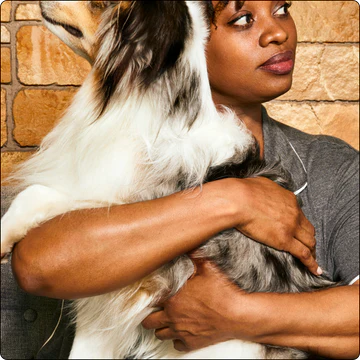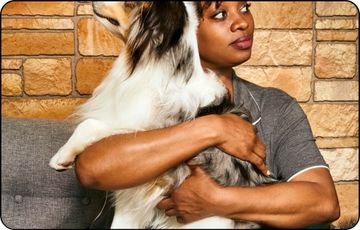Calm your dog's shaking and trembling with online vet help
Skip the trip and see one of our online vets to get treatment. Plans start at $11/mo.

- Unlimited vet visits and follow-ups
- Prescriptions delivered free to you
- 100% licensed veterinarians

What causes dogs to shake and tremble
Learn why dogs tremble and what to do about it.


Why dogs tremble?
Why dogs tremble?
There are many reasons why your dog may tremble, including fear, stress, excitement, old age, pain, and toxicity—to name a few. Whether they’re shaking due to a thunderstorm or to keep warm, it’s important to recognize when trembling may signal something more serious.
Fear, stress & anxiety
Fear, stress & anxiety
Trembling is a common response to fear, stress, and anxiety that environmental factors can trigger. This includes thunderstorms, fireworks, people passing by, and loud noises. Shaking is also a great way for dogs to release some pent-up tension caused by stress after certain situations. For example, when they’re in an unfamiliar location or around new people, dogs may shake.
Dogs can also experience feelings of stress and fear due to a traumatic event, a lack of socialization, or old age.
Treating your dog’s anxiety can help reduce the severity of symptoms, including shaking because of fear and anxiety. If you’re looking to manage your pet’s anxious behavior as soon as possible, schedule an online vet visit with Dutch. We’ll connect you with a top licensed veterinarian who can prescribe treatment to help your dog, without leaving home.
When to see a vet?
When to see a vet?
If you notice your dog is trembling, the first step is to assess your pet and their environment, looking for potential triggers. Certain situations where temperature regulation, stress from environmental factors, and excitement are the culprit may not warrant a trip to the vet since they’re generally not a cause for concern. You can contact Dutch to help identify what’s causing your dog to tremble. For example, if their shaking is due to a behavioral issue, a Dutch-affiliated vet may recommend anxiety meds for dogs alongside training to minimize symptoms.
There are other moments when trembling indicates something more critical, like toxicity, muscle injuries, and underlying conditions. It’s a good idea to speak to a vet to get your dog back to their happy self.
How Dutch works
-
Pick a plan and become a member
-
Schedule a video call with a licensed vet
-
Order the prescriptions the vet recommends
Frequently asked questions
What can I use Dutch for?
What can I use Dutch for?
With Dutch, you’re never alone when it comes to your pet’s health. Whether your pet needs care or you just have a question, our compassionate and knowledgeable vets are always happy to help.
Here are some ways you can use Dutch:
- Care & prescriptions for over 150 issues
- Behavioral health, nutrition, and exercise advice
- Puppy, kitten, and new pet parent advice
- Preventive care plans
- Night and weekend vet care
- Second opinions & follow-up care after in-person visits
- Advice on whether you need to go to the ER or urgent care
- Vet care when you’re traveling
- Easy prescription refills
- Longevity treatment plans
- Answers to non-urgent questions
What is a visit with Dutch like?
What is a visit with Dutch like?
When booking a video call with a vet, you'll be asked a few questions about your pet’s health issue. Depending on the issue, you may also be asked to fill out a longer questionnaire about their symptoms and share photographs of them so our veterinarians can better understand what’s going on. You’ll then pick an appointment time that works best for you.
During your video call, one of our licensed veterinarians will talk to you about the symptoms your pet is experiencing, ask you questions, review your pet’s medical history if you’ve provided it, and answer any questions you have. The vet will ask to see your pet and their environment. And they may ask you to perform some simple checks on them if needed.
After your video call, the vet will send you a message with a custom treatment plan to help your pet feel better, including a link to buy any recommended prescription or over-the-counter medications. Place your order and we’ll ship it free.
How do I know if you can treat my pet?
How do I know if you can treat my pet?
Our vets can provide care and prescriptions for more than 150 issues — and over 90% of cases can be treated virtually.
The vet can diagnose your pet based on your description of their symptoms, their medical history, seeing them during your video call, and, if needed, through uploaded photos and videos. They may ask you to do a few simple checks during the call. We also offer a number of at-home lab test kits for dogs and cats.
The health and safety of pets is our top priority. In the rare case that a vet determines a pet needs to go to a local clinic, they’ll provide a referral and offer advice on how to care for them until they can be seen.
Some things that require in-person care include emergencies, wounds that need stitches, and issues that require blood work, imaging (X-rays or ultrasounds), or surgery.
Our vets are always available for second opinions and follow-up care after in-person vet visits — so you don’t have to navigate health issues alone.
How much will it cost for Dutch to treat my pet?
How much will it cost for Dutch to treat my pet?
Our memberships are designed to make your pet’s care as easy and affordable as possible. Here’s how your costs will break down:
Membership: You can choose to pay the total price upfront or in 4 installments. All memberships include unlimited care for up to 5 pets at no extra cost.
Vet calls and messaging: No cost — video chat and message with vets as often as you need for free.
Medication: The price will vary depending on your pet’s needs. To keep your costs down, we offer a price-match guarantee, free standard shipping, $25 off your first product order, and 20% off your first flea & tick order.




